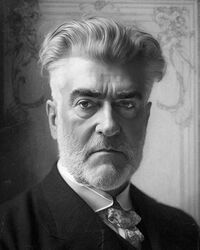Beranism
This article is incomplete because it is pending further input from participants, or it is a work-in-progress by one author. Please comment on this article's talk page to share your input, comments and questions. Note: To contribute to this article, you may need to seek help from the author(s) of this page. |
Beranism is an ontologically Idealistic moral philosophy which serves de jure as the state philosophy of the Prime Republic of Ostrozava. It originates from the works of early 20th-century Ostrozavan philosophers Vlastimil Beran and Julius Jahoda. While influenced by Wernerism, Beranism denies a fully materialist conception of the world by instead asserting that the Wernerist ideal of dialectical materialism only partially addresses the problem of oppression. Instead, Beranism synthesizes the dialectical idealism of NAME with the early psychology of figures such as Stan Báca, asserting that class struggle and human conflict stem from psychological needs rather than material needs. Drawing partially from Karminian conceptions, Beranism stresses that free will is not given, but rather seized through great mental effort; a classically Beranist axiom is
INSERT QUOTE — Vlastimil Beran, O Původu Boha
Upon returning to Karsko, various activists which had taken their own individual journeys abroad coalesed in the Three Forks Tavern (Ostrozavan: Hospoda Třividlice), where several intense philosophical discussions took place, attempting to outline commonalities observed between the individual members' observations about global religion, and the infant but revolutionary academic fields of psychoanalysis and Wernerist economics.
Fascinated by the discussions, Beran and Jahoda saw that the other members of their circle of friends, such as Vladan Vítek, had taken a more immediate interest in the emancipatory struggle, by 1900 already planning the early stages of the 1st Worker's Convention, in the nascent beginnings of the Crimson Revolution. Seeing the infant movements beginning to take steam, but taking note that many of the Ostrozavan peasantry had a noted "split between fanaticism or cynical indifference", Beran and Jahoda began writing O Původu Boha (Ang: On the Origin of God), widely considered to be the central text of what became Beranism. Though ostensibly agnostic in its worldview,
Beranism has had a profound impact on global academia, having influenced many fields, including archaeology, art history and theory, anthropology, media studies, science studies, political science, theater, history, sociology, cultural studies, education, economics, ethics, criminology, geography, literary criticism, film theory, psychology, and philosophy.

